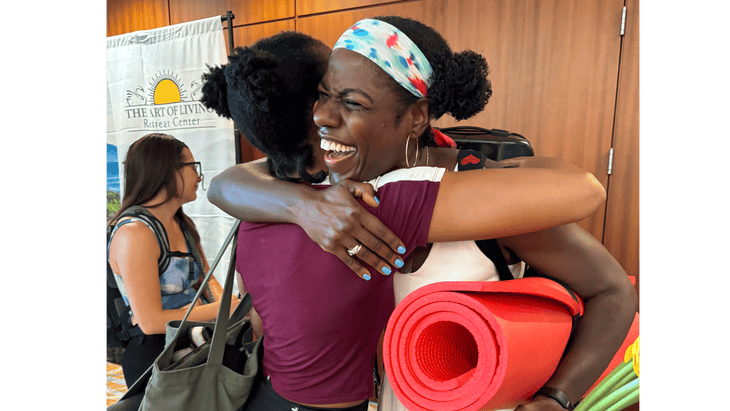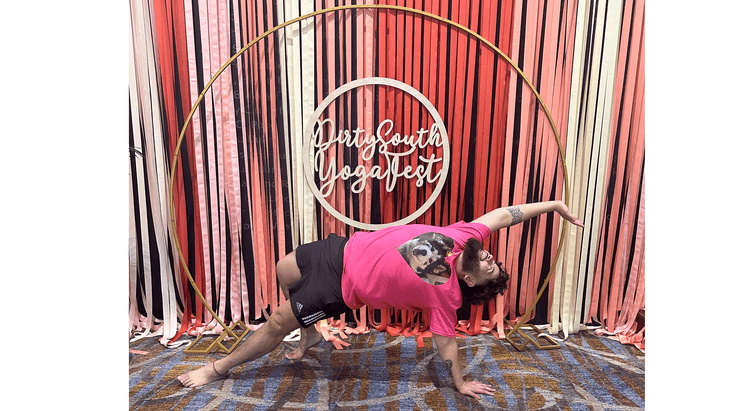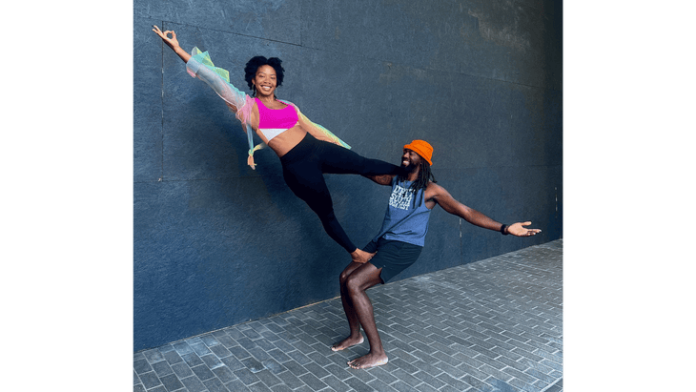“], “filter”: { “nextExceptions”: “img, blockquote, div”, “nextContainsExceptions”: “img, blockquote, a.btn, a.o-button”} }”>
Heading out the door? Read this article on the new Outside+ app available now on iOS devices for members!
>”,”name”:”in-content-cta”,”type”:”link”}}”>Download the app.
A little more than 10 years ago, yoga teacher Jessica Murphy started giving a lot of thought to how she connected with herself during her practice at local yoga studios but was left wanting more of a connection with others.
That led her to launch the homegrown Dirty South Yoga Fest in Atlanta, a weekend of 18 teachers leading 24 classes under a tagline of “Real. Raw. Southern Yoga.” It was designed as a welcoming of those who hadn’t yet found the community that is an integral but often overlooked part of the practice of yoga.
A decade later, Dirty South Yoga Fest continues and its theme remains largely the same. Last weekend, the three-day event resumed its emphasis on community via local teachers leading hundreds of attendees in workshops and workouts, lectures and laughter, chakra sessions and Chaturangas. There were sessions on practices as diverse as Katonah and Kundalini, acro and partner yoga as well as ancient mythology, classes set to the thumping of new age music and mostly silent yoga nidra sessions, and a goddess choir meditation the morning after a vinyasa class set to dueling DJs featuring Trap cued in rap.
“We’re a little rough around the edges,” asserts the Dirty South website. “We’ve never been described as prim and proper, we may sacrifice the easy route to pursue adventure, we choose bare-feet over dress shoes, we’ll get our hands dirty just to practice falling, our lifestyle calls us to live, to sweat, to be still, to get dirty, and to practice…above all to practice.”
Approximately 78 percent of the diverse attendees are new to the fest, explains Catherine Koonce, operations director for the festival. She explains that it draws locals largely through word of mouth although several tickets were purchased by those traveling from other states to experience the weekend-long vibe that is as much about laughter as it is the sound of crystal sound bowls.
That vibe largely creates itself, explains Koonce. She says the vibe shifts somewhat from year to year but becomes a result of the teachers and scholars and students exchanging expertise in community. There was no rushing out after a session as is often the case at studios and festivals. And prior to session, strangers constantly struck up conversations and rearranged mats to create their own little communities among the larger one.
That kind of community is essential in such a city of transplants, explained Michelle Hettmann, who handled social media for the fest. She considers the fest to be a highlight reel of the best of Atlanta in that it draws on diversity in all ways, including the population and styles of practice.

And it is very much a community. “They’ve done really well at curating the content and creating community,” said yoga teacher Allie Jaffe. She explained the size of the fest was perfect with it being “large enough to not feel boxed in to a small number of options and small enough to see familiar faces throughout the weekend.”
The current tagline of “connect to something bigger than ourselves” is part of the ongoing evolution of what Murphy originally had in mind. “Dirty South Yoga’s original vision was always to create a welcoming, inclusive, and lighthearted community for people to discover and explore the practice of yoga together. Our goal is also to celebrate and spotlight the diverse and gifted local teachers in our own backyard,” explained Murphy. “I firmly believe that while yoga is an individual practice, it is even more powerful when practiced together.”
The practice took on all forms imaginable, including a workshop on what yoga therapy is—and is not—with yoga therapist Patricia Schmidt and license clinical social worker and yoga teacher Dominique Harmon. Simultaneous sessions on breathwork consisted of a lecture by William Hufschmidt on the capacity of pranayama and breath science to regulate the nervous system while a separate silent disco-style session by Mimi Daara that celebrated SOMA breathwork and guided meditation. Sessions on acrobatic yoga focused on skillful communication between partners while an intuitive movement class helped attune students to their authentic vibe.

Classes were supportive, inclusive, with almost every teacher making reference in some fashion the need to take options that work for you and to find your ease. Most sessions addressed the physical, mental, and emotional aspects of contemporary life with direct tie-ins to how yoga can help you self-regulate through slowing the breath, retraining focus through the physical practice, and remaining ever mindful.
The community extends beyond the attendees. Organizers of the Dirty South Yoga Fest donate 10 percent of the proceeds to their non-profit partner, explains Koonce. The 2024 partner is the TNP Foundation, which supports mental wellness and mindfulness initiatives for youth and adults through schools and after-school programs, community organizations, and more. Last weekend, TNP sponsored a popular mindfulness lounge at the fest where attendees could slip away and simply chill in cushy chairs in between sessions.
As teacher Shelby Adina mentioned before taking students through a blindfolded slow flow and nidra practice, if you experience any of a long list of human traits, she said, “Then this is the place for you.”
One practice. Many expressions. And definitely a place for anyone.












